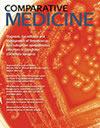Effects of Exogenous ATP on Melanoma Growth and Tumor Metabolism in C57BL/6 Mice.
IF 1.1
4区 农林科学
Q2 VETERINARY SCIENCES
引用次数: 0
Abstract
Altered energy metabolism (glucose, lipid, amino acid) is a hallmark of cancer growth that provides the theoretical basis for the development of metabolic therapies as cancer treatments. ATP is one of the major biochemical constituents of the tumor microenvironment. ATP promotes tumor progression or suppression depending on various factors, including concentration and tumor type. Here we evaluated the antitumor effect of extracellular ATP on melanoma and the potential underlying mechanisms. A subcutaneous tumor model in mice was used to investigate the antitumor effects of ATP. Major lymphocyte cell changes and intratumoral metabolic changes were assessed. Metabolomic analysis (1H nuclear magnetic resonance spectroscopy) was performed on tumor samples. We measured the activities of lactate dehydrogenase A (LDHA) and LDHB in the excised tumors and serum and found that ATP and its metabolites affected the proliferation of and LDHA activity in B16F10 cells, a murine melanoma cell line. In addition, treatment with ATP dose-dependently reduced tumor size in melanoma-bearing mice. Moreover, flow cytometry analysis demonstrated that the antitumor effect of ATP was not achieved through changes in T-cell or B-cell subsets. Metabolomics analysis revealed that ATP treatment simultaneously reduced multiple intratumoral metabolites related to energy metabolism as well as serum and tumor LDHA activities. Furthermore, both ATP and its metabolites significantly suppressed both tumor cell proliferation and LDHA activity in the melanoma cell line. Our results in vivo and in vitro indicate that exogenous ATP inhibits melanoma growth in association with altered intratumoral metabolism.外源性ATP对C57BL/6小鼠黑色素瘤生长和肿瘤代谢的影响。
能量代谢(葡萄糖、脂质、氨基酸)的改变是癌症生长的一个标志,为癌症代谢疗法的发展提供了理论基础。ATP是肿瘤微环境的主要生化成分之一。ATP促进肿瘤进展或抑制取决于多种因素,包括浓度和肿瘤类型。在这里,我们评估了细胞外ATP对黑色素瘤的抗肿瘤作用及其潜在的机制。采用小鼠皮下肿瘤模型研究ATP的抗肿瘤作用。评估主要淋巴细胞的变化和肿瘤内代谢的变化。对肿瘤样本进行代谢组学分析(1H核磁共振波谱)。我们测量了切除肿瘤和血清中乳酸脱氢酶A (LDHA)和LDHB的活性,发现ATP及其代谢物影响小鼠黑色素瘤细胞系B16F10细胞的增殖和LDHA活性。此外,ATP剂量依赖性治疗可减少黑色素瘤小鼠的肿瘤大小。此外,流式细胞术分析表明,ATP的抗肿瘤作用不是通过改变t细胞或b细胞亚群来实现的。代谢组学分析显示,ATP治疗同时降低了与能量代谢相关的多种肿瘤内代谢物以及血清和肿瘤LDHA活性。此外,在黑色素瘤细胞系中,ATP及其代谢产物均能显著抑制肿瘤细胞增殖和LDHA活性。我们在体内和体外的研究结果表明,外源性ATP抑制黑色素瘤生长与瘤内代谢改变有关。
本文章由计算机程序翻译,如有差异,请以英文原文为准。
求助全文
约1分钟内获得全文
求助全文
来源期刊

Comparative medicine
医学-动物学
CiteScore
1.90
自引率
0.00%
发文量
71
审稿时长
6-12 weeks
期刊介绍:
Comparative Medicine (CM), an international journal of comparative and experimental medicine, is the leading English-language publication in the field and is ranked by the Science Citation Index in the upper third of all scientific journals. The mission of CM is to disseminate high-quality, peer-reviewed information that expands biomedical knowledge and promotes human and animal health through the study of laboratory animal disease, animal models of disease, and basic biologic mechanisms related to disease in people and animals.
 求助内容:
求助内容: 应助结果提醒方式:
应助结果提醒方式:


